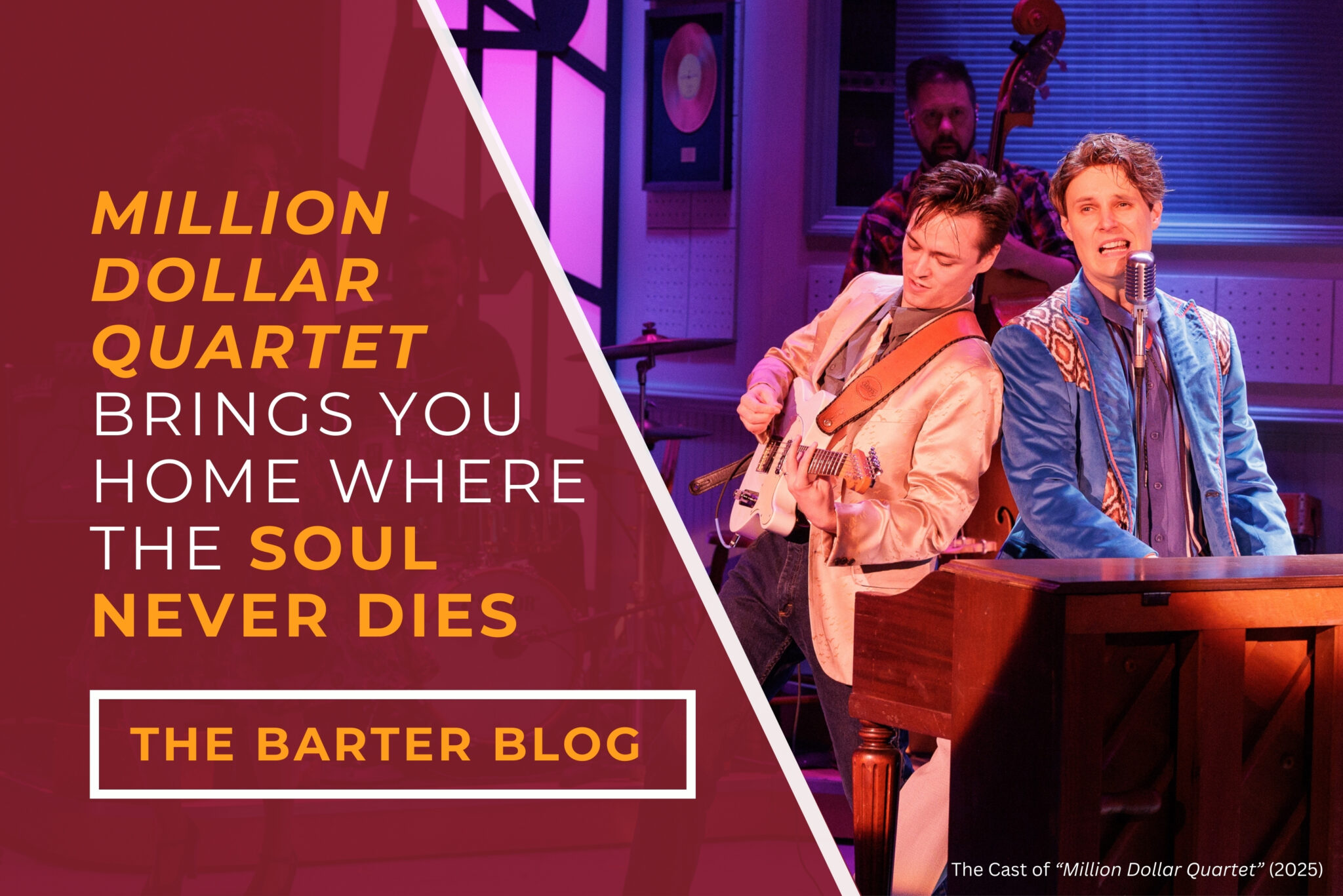
By Bonny Gable –
Enter the room where the cast of “Million Dollar Quartet” is rehearsing and the sparks of energy churning there are so electrifying you can feel them shooting deep down into your bones.
Ideas are popping, swapping back and forth; music is bursting from every cell in their bodies. This dynamic tumble of creativity is heading towards one final destination: making a dynamite performance that tells a story like no other—the birth of the real-life Million Dollar Quartet.
It happened on December 4, 1956 at Sun Records Studio in Memphis, Tennessee when the planets aligned to magically bring together young Johnny Cash, Jerry Lee Lewis, Carl Perkins and Elvis Presley, spurring an impromptu jam session the likes of which had never happened before, and has never happened since.
You can enter that room at Barter Theatre’s Gilliam Stage in Abingdon, Virginia, as it presents “Million Dollar Quartet,” with book by Colin Escott and Floyd Mutrux, and the unforgettable music of four titans of American popular music.
What sets this show apart from a standard concert are the stories of these budding artists’ lives. Director Nicholas Piper says, “We are seeing them before they were icons. We see them on the eve of change. Those sensing a ‘big change’ must decide whether to embrace it, or to hold on and hinder progress.”
Founder of Sun Records, Sam Phillips, played by Adam Poole, is a guide through the stories, just as he was a shepherd to those emerging star musicians. Poole says, “Sam loved the quote ‘This is where the soul of a man never dies.’ He carried that with him throughout his entire career, and he was always looking for that in artists. He’d tell them, ‘I want to hear your soul.’”
Nick Voss, who portrays Elvis, says, “One thing I love about Elvis is that he was a giving person, and I don’t think that gets told a lot. He was someone who felt responsible for putting food in everyone’s mouths and taking care of everyone. And I think that responsibility weighed heavily on him, because he felt that he couldn’t stop being Elvis—for them.”
Jerry Lee Lewis, played by Dominique Scott, is the artist most in the infancy of his career. “He believes he has something special that nobody else has,” says Scott, “and he’s dead set on proving it to everybody. He’s the best, and he knows he’s the best. And there’s a lot of comedy that comes through that in our show. It’s something the audience can relate to, just this youthful ignorance and brashness that people just love.
When asked to provide a word to describe the musical time capsule these four created in 1956, Peter Oyloe, who plays Johnny Cash, says, “Monumental. There’s a synergy that comes with critical mass, those sorts of rare occurrences when atoms collide. There’s a kind of a quiet power in that, and a ripple effect. There’s a reason why we’re still talking about these particular men today.”
“Home,” Voss added. “I feel like all four of them, on that one night, got to really relate to each other, because they all love that gospel style, the rhythm & blues, and country. And when you listen to the actual session itself, when they do songs like “Riverside” and “Peace in the Valley,” there’s a real feeling of comfort and ‘home’ for each one of them. You can hear, when they’re singing together, that they are almost ‘brothers’ in that hour.”
“I think about it as a ‘flashpoint’ in popular culture,” says Will Riddle, who plays Carl Perkins. “This was a period of time when record labels held the keys to the kingdom, but then the ‘artist’ started to become king, as opposed to a label dictating, necessarily, what an audience was going to be enamored with.”
As director, Piper has amazing insight into the characters’ fears, conflicts, and the intriguing dynamics among them. He lets us in on what makes everyone either click or clash. As an example, Piper says, “For record producer Sam Phillips, there is pain; he needs to not be passed by. It’s relatable and helps reveal the play’s universality.”
Voss adds, “There are moments in the show that are dramatized as conflict, because that’s part of doing a show. In real life I’m sure there were feelings there, but in our show, Elvis is the boy who went Hollywood, and he’s coming back home to these guys who are writing their own music and putting their heart into it. Elvis would love to be in that circle and be a writer, and I think it’s something he sought his entire career. But in this moment, he just wants to feel like he’s part of them.”
Riddle adds, “We are sharing with the audience the ways in which these were simply men, full of contradictions and failures and hopes and failed aspirations. They gave everything of themselves to end up in the place that we know them now.”
With variations in personalities of great talents, drama is inevitable. Scott describes this way: “I put Jerry Lee Lewis on one end of the spectrum and Johnny Cash on the exact opposite end. Cash tends to be cooler, calm, collected, with a lower voice as well. Whereas Lewis is a firecracker, a fireball – things are faster, louder, higher, crazier. So, it’s nice to have the juxtaposition of the two, with Elvis and Carl falling somewhere in the middle. This wide range of temperaments makes it very dynamic.
“We understand what the music means to people, so there’s a great deal of effort put into making it authentic, so the people can experience it exactly as they remember it. I think that the newness is the story. And that’s really what holds the show together. The newness comes from the story, and the music will feel like a warm blanket that you’ve been in your whole life.”
Whether you’ve loved this music all your life, or you come to the show with virgin ears, “Million Dollar Quartet” offers an opportunity to experience facets of history that may have eluded you before. Once you’ve spent a magical couple of hours with these charismatic men, captive to their fascinating stories and music, you just might not want to leave.
Barter Theatre’s production of “Million Dollar Quartet” runs April 11-May 11 in Abingdon, Virginia.
Bonny Gable is a former theater professor, an arts journalist and freelance writer based in Bristol, Virginia. www.bonnygable.com

